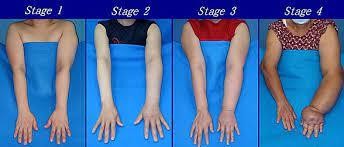A 60-year-old male client has been diagnosed with diabetes mellitus type 2 and chronic heart failure for many years, for which he takes hydrochlorothiazide (HCTZ), digoxin, and metformin. After his wife died last year, his health declined, and he was admitted to a local nursing home.
For the past 6 months, he has experienced cognitive decline, most likely due to hypoxia and/or multi-infarct dementia. The nurse referred the client to the registered dietitian nutritionist because of a 10-lb (4.5-kg) weight loss in 2 weeks, anorexia, and increasing blood glucose levels. The registered dietitian nutritionist prescribed oral supplemental feedings, and his metformin dose was increased by the primary health care provider. Today the charge nurse receives the client's latest lab work.
Based on the physical assessment findings, medical diagnoses, and lab test values, the nurse suspects that the client most likely has , which requires emergency management with
Choose the most likely options for the information missing from the statement by selecting from the lists of options provided.
The Correct Answer is {"dropdown-group-1":"B","dropdown-group-2":"D"}
Choice A rationale: The lab results and clinical picture, such as weight loss, anorexia, and high blood glucose levels, point more toward a hyperglycemic state rather than severe hypoglycemia.
Choice B rationale: The client's elevated blood glucose levels, weight loss, and anorexia suggest a hyperglycemic state, possibly hyperosmolar hyperglycemic state, which requires fluid management and insulin to address the severe dehydration and high blood glucose levels.
Choice C rationale: Although high glucose levels are evident, the absence of significant acidosis (as seen in diabetic ketoacidosis) and extreme ketosis makes this diagnosis less likely.
Choice D rationale: The lab values and clinical presentation do not strongly align with a primary respiratory acidosis diagnosis, which typically involves changes in pH and carbon dioxide levels.
Nursing Test Bank
Naxlex Comprehensive Predictor Exams
Related Questions
Correct Answer is B
Explanation
Choice A rationale: Her healthcare provider prescribing a calcium channel blocker for hypertension is not directly linked to lymphedema.
Choice B rationale: Sustaining an insect bite to her left arm yesterday - Trauma or injury, such as an insect bite, to the affected limb post-mastectomy can increase the risk of
lymphedema.
Choice C rationale: Losing twenty pounds since the surgery might influence overall health but doesn’t specifically relate to lymphedema.
Choice D rationale: Her hobby of playing classical music on the piano is unrelated to the risk of developing lymphedema.

Correct Answer is C
Explanation
Choice A rationale: Pulmonary embolism would cause chest pain, dyspnea, and hemoptysis, but not petechiae or neurological changes.
Choice B rationale: While chest pain might be associated with myocardial infarction, the combination of symptoms aligns more with a pulmonary embolism.
Choice C rationale: Fat embolism syndrome occurs when fat globules from the bone marrow enter the bloodstream and travel to the lungs, brain, or other organs. This can
cause respiratory distress, neurological impairment, petechiae (reddish-purple spots on the skin), and cardiac dysfunction.
Choice D rationale: Compartment syndrome doesn't typically manifest with respiratory symptoms or reddish-purple spots.
Whether you are a student looking to ace your exams or a practicing nurse seeking to enhance your expertise , our nursing education contents will empower you with the confidence and competence to make a difference in the lives of patients and become a respected leader in the healthcare field.
Visit Naxlex, invest in your future and unlock endless possibilities with our unparalleled nursing education contents today
Report Wrong Answer on the Current Question
Do you disagree with the answer? If yes, what is your expected answer? Explain.
Kindly be descriptive with the issue you are facing.
